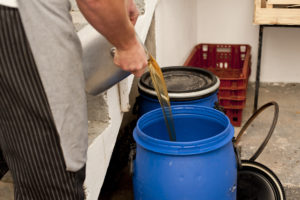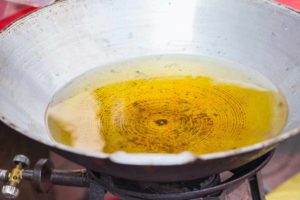After preparing a delicious batch of homemade fried chicken for dinner, you now have to clean up. It’s one thing to clean up grease splatters, but you might not know what to do with the spent sunflower oil. If you’ve never deep-fried at home, don’t pour the used sunflower oil down the sink. Yes, it may seem simpler to dispose of spent oil down the drain or any other drain, but that is actually the worst alternative. Why? Fats and oils can harden, clog your pipes, and cause extensive damage.
Solid oils can attract bugs, clog pipes, and contaminate waterways in addition to blocking your plumbing system. Here is a list of the top techniques for cooking oil disposal that won’t endanger your plumbing. Even though you might believe that a little oil flushed down the sink won’t cause any harm, it all adds up. Because oil and water can not mix, the oils and fats congregate to form fatbergs.
Oils may leak out when trash bags tear if you pour fats and oils directly into the trash can. This might be damaging to the environment and attract pests. Because of this, it’s crucial that we take great care to dispose of oil and fat in sealed containers. Take a piece of kitchen roll and wipe off any remaining fat on your pans and trays rather than rinsing them in the sink. Place the kitchen roll in the trash, and then wash your cookware as usual.

Put spent sunflower oil in a lidded, disposable container. This can be a grease disposal container that was purchased, a plastic milk jug or carton, a coffee can, or a bottle of cooking oil. Place the container in your household garbage after sealing it. Do you reside near a restaurant? If you have a lot of oil to get rid of—say, if you’re intending to deep-fry a turkey—try reaching out to them about adding it to their collection container. You could also get in touch with NJ Oil Recyclers to have the oil collected and recycled.
You may add modest amounts of any vegetable oil you use—soy, corn, coconut, olive, or sunflower oil are all 100% vegetable oils—to your compost pile (and we do emphasize small here, as too much oil in your compost could become a fire hazard). Cooking oil will be consumed by earthworms. But make sure you’re only using vegetable oils for this.
After you’ve finished frying, remove the pan from the heat and allow the oil to cool down until it reaches room temperature. Use a strainer with cheesecloth or a coffee filter to catch any food particles. Cooking oil that has been filtered and cooled should be kept in a food-safe container, even the original bottle. A grease keeper can be purchased to speed up this procedure. Used sunflower oil can be safely stored in the refrigerator for up to a month.
It’s crucial to properly dispose of sunflower oil if you run a catering or restaurant business. Because the consequences might be so severe, failing to do so may result in prosecution. If pipes are stopped, it could result in floods and it might also cause sewage to overflow.
For keeping different types of oil, including used sunflower oil, in containers larger than 200 liters, the government has special regulations. If you keep your oil in a structure, you also have to abide by fire safety laws. Your local council can tell you what the rules are in your area. No matter if you are a restaurant owner or a home cook, NJ Oil Recyclers can assist you in getting rid of wasted sunflower oil.
You can reuse your oil and fats as long as you heated the oil properly and didn’t heat it above its smoke point. Utilize these three straightforward procedures to recycle the cooking oil. To remove any food residue, strain the warm oil through cheesecloth, paper towels, or coffee filters. Keep in the refrigerator, freezer, or another cool, dark area in an airtight container.

Before using, smell the cooking fat to make sure it is not rancid.
Sunflower oil is reusable for deep-frying, pan-frying, and baking. Oil should be disposed of in your garbage bin after a few uses or when it becomes bad.
Avoid flushing used sunflower oil down the drain. Although it might seem sensible to do so, doing so could clog your drain. Warm oil is still in liquid form as you pour it down the drain, but sunflower oil will cool and solidify. Then, getting rid of the oil won’t be your only issue.
Avoid dumping the oil in your garden. The dumped dangerous cooking oil may cause harm to many different kinds of animals if consumed. This will then have an impact on your garden’s ecosystem. Just give NJ Oil Recyclers a call. You won’t have to do a thing; just keep storing the spent sunflower oil in a safe place, and we’ll come to get it so it can be recycled rather than clogging pipes.
You can also get in touch with a nearby restaurant that responsibly disposes of its spent oil. Discover which eatery in your area has an environmental policy and see if they can help. Normally, the restaurant would safely get rid of the vast amounts of oil. If you need to dispose of a lot of cooking oil, pour it into big containers and take it to the nearest dump.
Used sunflower oil collectors are also available. And is an easy way to get rid of waste oil. They gather a lot of oil, which is then sold to the chemical and biodiesel sectors. The oil is recycled in this way so that it can be used in these sectors rather than for human consumption. When you get rid of the oil, you also need to look into this. However, make sure you are storing it in the appropriate containers first so that it may be provided for recycling.



